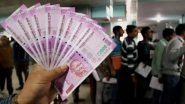Shanghai, May 10: A Chinese court jailed the former high-flying head of troubled Anbang Insurance Group for 18 years today for defrauding the company of more than USD 10 billion. Wu Xiaohui was toppled as Anbang's head last year and China's insurance regulator announced an unprecedented takeover of the conglomerate in February, as the government moves to prevent heavily-indebted large private companies from collapsing and posing a risk to the financial system.
Established in 2004, Anbang grew rapidly into a financial-services powerhouse, making waves in 2014 by buying New York's landmark Waldorf Astoria hotel for USD 1.95 billion and other acquisitions. In addition to the prison sentence, the Shanghai Municipal No. 1 Intermediate People's Court announced that it had ordered the seizure of 10.5 billion yuan (USD 1.6 billion) worth of his property and the suspension of his political rights for four years.
The court found him guilty of defrauding Anbang of more than 65 billion yuan following a trial in March. Between 2011 and 2017, Wu ordered others to produce false earnings reports, disclose false information, fake fund injections and conceal insurance revenue to deceive regulators, the court said.
"(Wu) used bait by promising interest rates higher than the bank depository rate to illegally absorb large amounts of funds, which exceeded the scale the former insurance regulator approved," it said. The government's swoop on Anbang marked its most aggressive step yet to rein in politically connected conglomerates that grew rapidly and launched a wave of splashy multibillion-dollar overseas investments fuelled by excessive debt.
The government of President Xi Jinping, who has dramatically strengthened his grip on power recently, has made cleaning up financial risks a top national priority. Wu's situation marks a startling fall from grace for a man who reportedly married a granddaughter of the late Chinese leader Deng Xiaoping -- a sign that even political connections cannot guarantee immunity.
Beijing-based Anbang used massive sales of short-term, high-yield policies to become one of China's biggest insurers, but regulators are now believed to fear the company had hugely overextended. The company made a failed USD 14 billion bid for the Starwood hotels chain in 2016. It also was in aborted talks with Donald Trump's son-in-law and adviser Jared Kushner to redevelop a Manhattan office tower, Bloomberg News reported last year.
Anbang's takeover by the authorities is due to last a year but the government has said it could be extended if necessary as authorities work to restructure the firm. The highly unusual commandeering signalled deep official concern over the Beijing-based company's financial situation and appeared to confirm that toxic financial risks lurked in the world's second-largest economy.
The company announced in April that the government would inject 60.8 billion yuan into it.
Acquisitive private companies such as Anbang, HNA, Fosun and Wanda spent billions on the overseas purchases of everything from European football clubs to hotel chains and movie studios. But authorities, who originally encouraged such asset-shopping, abruptly reversed course over the past year, clamping down amid concerns over capital flight and fears that companies could collapse and trigger a financial contagion at home.
They have also become increasingly alarmed by conglomerates' murky webs of subsidiaries and debt and their potential threat to China's economy. The four firms are referred to as "grey rhinos" -- plodding financial beasts that could charge quickly, with damaging systemic results. In response, the government has for more than a year implemented ever-tighter controls to curb excessive debt and "irrational" investments overseas.
(The above story is verified and authored by Press Trust of India (PTI) staff. PTI, India’s premier news agency, employs more than 400 journalists and 500 stringers to cover almost every district and small town in India.. The views appearing in the above post do not reflect the opinions of LatestLY)













 Quickly
Quickly


